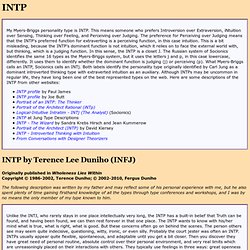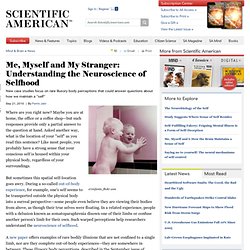

Locus of control. In personality psychology, locus of control refers to the extent to which individuals believe that they can control events that affect them. Understanding of the concept was developed by Julian B. Rotter in 1954, and has since become an aspect of personality studies. A person's "locus" (Latin for "place" or "location") is conceptualized as either internal (the person believes they can control their life) or external (meaning they believe that their decisions and life are controlled by environmental factors which they cannot influence, or by chance or fate).[1] Individuals with a high internal locus of control believe that events in their life derive primarily from their own actions: for example, when receiving test results, people with an internal locus of control would tend to praise or blame themselves and their abilities, whereas people with an external locus of control would tend to praise or blame an external factor such as the teacher or the test.[2] History[edit] Applications[edit]
INTP. Originally published in Wholeness Lies WithinCopyright © 1986-2002, Terence Duniho; © 2002-2010, Fergus Duniho The following description was written by my father and may reflect some of his personal experience with me, but he also spent plenty of time gaining firsthand knowledge of all the types through type conferences and workshops, and I was by no means the only member of my type known to him.

During the mid 20th century, Carl Jung identified eight personality types and divided them into sixteen subtypes. My type is Introverted Thinker [Ti], and my subtype relies on Extraverted Intuition [Ne] as an auxiliary function. The MBTI calls this type INTP, while Socionics calls it INTj. These are mere semantic differences between two theories derived from the same original work. Introversion Rather than beginning with proof positive that this is my type, I will work up to it. The psychologist Hans Eyesenck gave a physiological model for understanding introversion vs. extraversion. Thinking. Me, Myself and My Stranger: Understanding the Neuroscience of Selfhood. Where are you right now?

Maybe you are at home, the office or a coffee shop—but such responses provide only a partial answer to the question at hand. Asked another way, what is the location of your "self" as you read this sentence? Like most people, you probably have a strong sense that your conscious self is housed within your physical body, regardless of your surroundings. But sometimes this spatial self-location goes awry.
During a so-called out-of-body experience, for example, one's self seems to be transported outside the physical body into a surreal perspective—some people even believe they are viewing their bodies from above, as though their true selves were floating. A new paper offers examples of rare bodily illusions that are not confined to a single limb, nor are they complete out-of-body experiences—they are somewhere in between. Patient 1 was a 55-year-old man who had suffered from epilepsy since he was 14 years old. How to Live With an Unknowable Mind.
We know surprisingly little about our own personalities, attitudes and even self-esteem.

How do we live with that? How do you imagine your own mind? I sometimes picture mine as a difficult and contrary child; the kind that throws a stone at you for no reason and can’t explain itself. Or while at the beach it sits silent, looking miserable. But, at a wedding is determined to scream at the top of its lungs through all the quiet bits. One reason minds can be frustrating is that we only have access to part of them, by definition the conscious part. Except we don’t know it’s doing things we haven’t asked it to, because we can’t interrogate it. This is quite a different view of the mind than Freud had. The idea that large parts of our minds can’t be accessed is fine for basic processes like movement, seeing or hearing. Other parts would be extremely interesting to know about. Here are three examples of areas in which our self-knowledge is relatively low: 1.
Don’t be so sure. 2. 3.